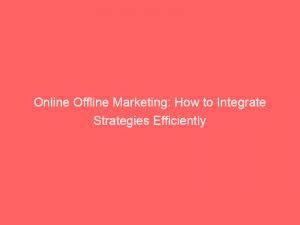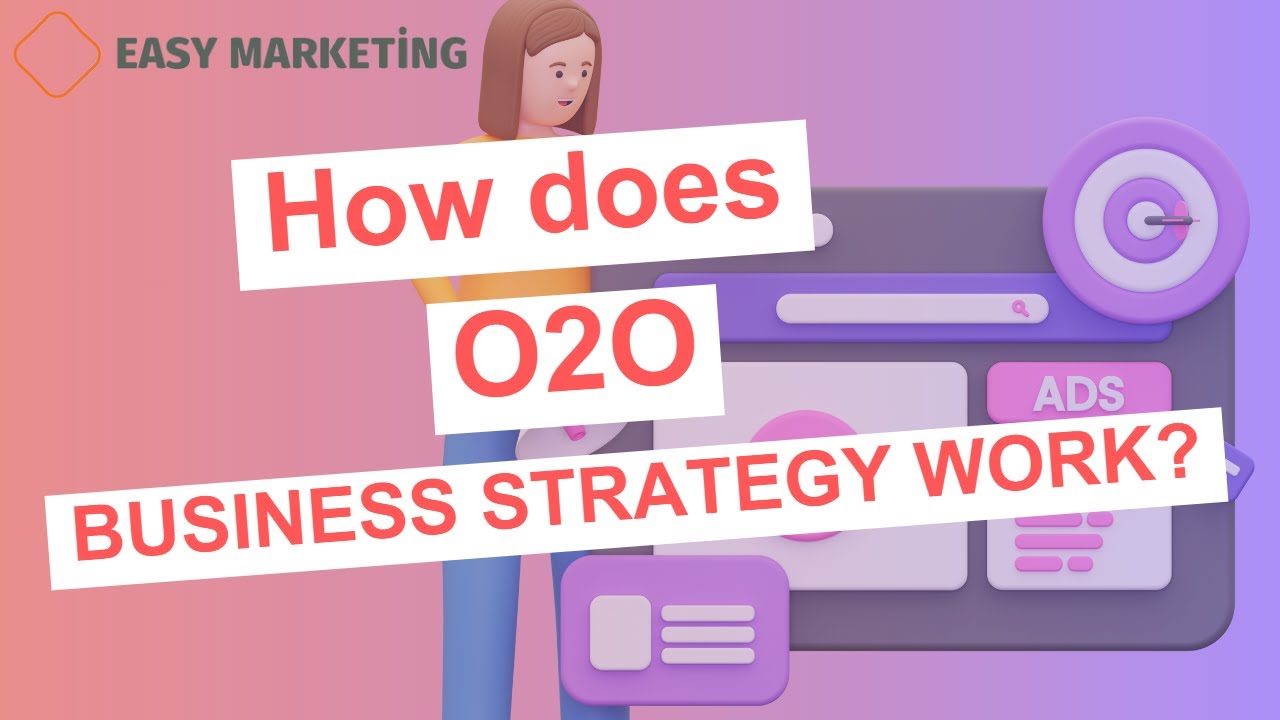In today’s interconnected world, the lines between online and offlinemarketing have blurred, creating a powerful hybrid approach that drives business success. Gone are the days when businesses could rely solely on newspaper ads or physical storefronts to attract customers.
Now, a vibrant online presence is essential, complemented by offlinestrategies that create a tangible, immersive experience. The pandemic may have tested our ability to connect physically, but it has underscored the importance of building a robust virtual community.
Join us as we delve into the intertwining worlds of online and offlinemarketing, and discover the key to unlocking audience engagement and brand recognition in a rapidly evolving landscape.
| Item | Details |
|---|---|
| Topic | Online Offline Marketing: How to Integrate Strategies Efficiently |
| Category | Ads |
| Key takeaway | In today's interconnected world, the lines between online and offline marketing have blurred, creating a powerful hybrid approach that drives business success. |
| Last updated | December 28, 2025 |
online offline marketing
Online offline marketing refers to the integration of both online and offline strategies to effectively reach and engage target audiences. Community engagement plays a vital role in building relationships with customers and businesses in the local area.
Hosting events is an effective way to generate buzz and attract new customers, while press releases help reach a larger audience and generate publicity. Offering free workshops not only attracts potential customers but also positions the business as an authority.
Offline marketing strategies still hold value in reaching less tech-savvy demographics and creating connections. Incorporating both online and offline marketing strategies maximizes reach and engagement.
Unique business cards created by local designers or print shops can have a stronger impact than online generators. Partnering with organizations that align with company values benefits community engagement.
Sending press releases and inviting local journalists to special events boost brand awareness. Offline marketing materials should include useful tips to be effective.
Digital marketing remains crucial, but offline marketing should still be a part of the overall strategy. In a post-pandemic world, workshops and billboards can be effective in standing out as a brand.Key Points:
- Online offline marketing combines both online and offline strategies to reach target audiences effectively.
- Hosting events and press releases are effective methods to generate buzz and attract new customers.
- Offering free workshops positions the business as an authority and attracts potential customers.
- Offline marketing strategies are valuable in reaching less tech-savvy demographics and creating connections.
- Unique business cards and partnerships with aligned organizations enhance community engagement.
- Digital marketing is crucial, but offline marketing remains important in a post-pandemic world.
Sources
https://www.forbes.com/sites/theyec/2021/02/08/nine-smart-ways-to-unify-online-and-offline-marketing-strategies/
https://blog.hubspot.com/marketing/offline-marketing
https://blog.hubspot.com/marketing/online-offline-marketing-together
https://digitalmarketinginstitute.com/blog/7-ways-to-optimize-online-to-offline-marketing
Check this out:
💡 Pro Tips:
1. Collaborate with local influencers or bloggers to create content and promote your business both online and offline.
2. Utilize guerrilla marketing tactics, such as placing creatively designed stickers or posters in strategic locations, to grab attention in the local community.
3. Consider partnering with other local businesses for cross-promotion and joint marketing efforts, both online and offline.
4. Utilize local radio, TV, and print media to reach a wider audience and target specific demographics that may not be as active online.
5. Create a referral program where satisfied customers are incentivized to refer their friends and family to your business, both online and offline.
Importance Of Community Engagement In Online And Offline Marketing
Community engagement plays a vital role in building lasting relationships between businesses and their customers. It allows companies to establish a presence in their local area and connect with the community on a more personal level.
Both online and offline marketing strategies contribute to community engagement, ensuring that businesses can reach a broader audience and connect with customers in meaningful ways. Whether it’s through social media interactions or face-to-face conversations at local events, community engagement helps foster trust and loyalty, ultimately leading to increased brand awareness and customer retention.
In the realm of online marketing, community engagement can take various forms. Businesses can actively participate in online discussions, respond to customer inquiries and feedback on social media platforms, and create valuable content that resonates with their target audience.
By consistently engaging with their online community, businesses can build relationships, establish credibility, and demonstrate their commitment to customer satisfaction.
Similarly, offline marketing strategies are equally important for community engagement. Hosting events is a powerful way to generate buzz and attract new customers.
Whether it’s an open house, product launch party, or seminar, events provide an opportunity for businesses to showcase their offerings and connect with potential customers face-to-face. These events create a sense of excitement and exclusivity, enticing people to attend and experience the brand firsthand.
These partnerships may involve co-hosting events, sponsoring community initiatives, or collaborating on joint marketing campaigns, further amplifying the impact of their marketing efforts.
Generating Buzz And Attracting Customers Through Event Hosting
One of the most effective ways to generate buzz and attract new customers is through event hosting. Whether a grand opening, product launch, or community gathering, events provide a unique opportunity to showcase a business and create excitement around its offerings.
By hosting events, businesses can:
Additionally, events allow businesses to showcase their products or services in a tangible way. Potential customers can interact with the offerings, ask questions, and gain first-hand experience.
This personalized experience helps build trust and confidence in the business, further solidifying the relationship with customers.
Reaching A Larger Audience With Press Releases
Press releases are a powerful tool for businesses to reach a larger audience and generate publicity. By crafting persuasive and newsworthy content, businesses can attract the attention of journalists and media outlets, increasing the chances of getting featured in news stories and publications.
Press releases offer several advantages:
Updated for the new year’s advertising best practices.
To maximize the effectiveness of press releases, businesses must ensure the content is newsworthy, concise, and tailored to the target audience. Including relevant quotes, statistics, and success stories can add credibility and make the press release more engaging for journalists and readers alike.
Additionally, businesses should continuously monitor media outlets and build relationships with local journalists to increase their chances of getting coverage.
Attracting Potential Customers Through Free Workshops
Offering free workshops is an excellent way for businesses to attract potential customers and position themselves as authorities in their industry. Workshops provide an opportunity for businesses to share their expertise, showcase their products or services, and build trust with attendees.
Here’s why free workshops are so effective:
When planning a workshop, businesses should carefully consider the topic, target audience, and desired outcomes. It is essential to choose a topic that aligns with the business’s expertise and appeals to the target market.
By providing valuable and relevant information, businesses can position themselves as go-to resources in their industry, attracting and retaining loyal customers.
Programmatic Advertising • Native Ad Network • Performance Marketing Tips • Self-Serve DSP Platform • Advertising Platform for Marketers











